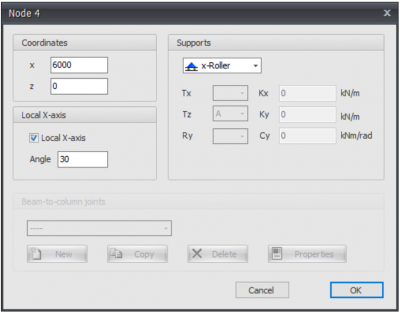Local coordinate system: Difference between revisions
Jump to navigation
Jump to search
(Created page with "In every node a node-coordinate system can be added. The origin lies in the relevant node. The direction of the x-axis is determined by inserting an angle ( see the figure above). Local coordinate systems can be used to calculate node limitations ( support reactions and restrains ), node loads and/or node deformations in an arbitrary direction. Node2 Local X-axis") |
No edit summary |
||
| Line 1: | Line 1: | ||
In every node a node-coordinate system can be added. | In every node a node-coordinate system can be added. | ||
[[File:XBeam2DLocalAxis.png|600px]] | |||
The origin lies in the relevant node. The direction of the x-axis is determined by inserting an angle ( see the figure above). Local coordinate systems can be used to calculate node limitations ( support reactions and restrains ), node loads and/or node deformations in an arbitrary direction. | The origin lies in the relevant node. The direction of the x-axis is determined by inserting an angle ( see the figure above). Local coordinate systems can be used to calculate node limitations ( support reactions and restrains ), node loads and/or node deformations in an arbitrary direction. | ||
[[File:XBeam2DLocalAxis2.png|400px]] | |||
Local X-axis | Local X-axis | ||
Revision as of 11:52, 31 August 2022
In every node a node-coordinate system can be added.
The origin lies in the relevant node. The direction of the x-axis is determined by inserting an angle ( see the figure above). Local coordinate systems can be used to calculate node limitations ( support reactions and restrains ), node loads and/or node deformations in an arbitrary direction.
Local X-axis

